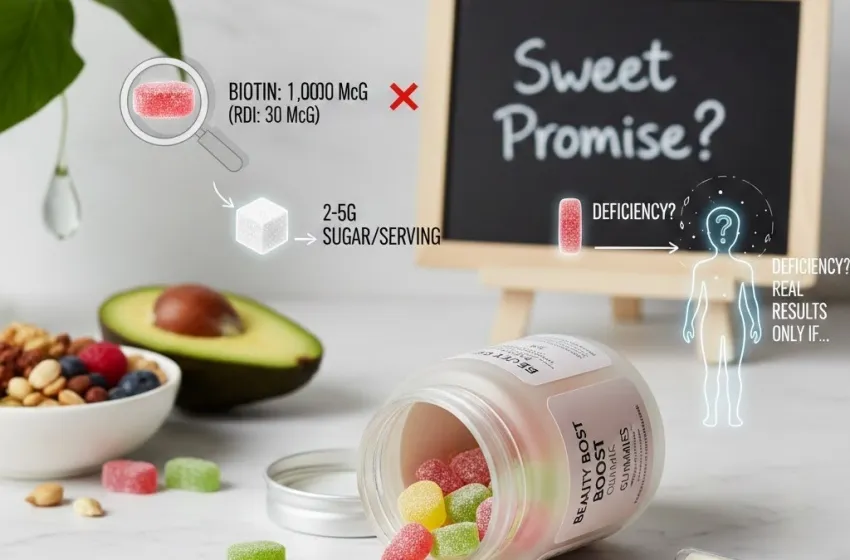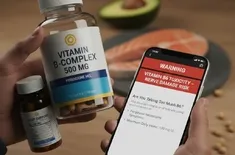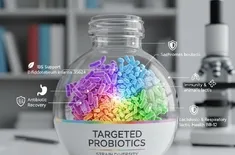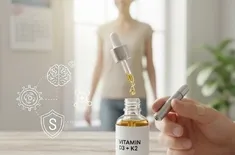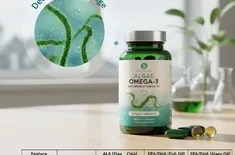Learn realistic expectations and if your vitamin deficiencies are being fixed.
Hair, skin, and nail gummy vitamins have exploded in popularity, lining the shelves of drugstores and dominating social media feeds with their appealing flavors, vibrant colors, and promises of luscious locks and glowing skin. They are, after all, an infinitely more tempting way to take your daily supplements than a chalky pill. But are these sweet treats truly a magic bullet for beauty, or simply a well-packaged blend of vitamins and hope?
The undeniable truth is that the allure of these gummies often far outweighs the tangible, scientifically proven benefits for the average consumer. To understand their real impact, we must peel back the sweet layer and critically examine the ingredients, the marketing claims, and the realistic expectations one should have when adding these to a wellness routine.
The Star Ingredient: A Critical Look at High-Dose Biotin
The backbone of virtually every hair, skin, and nail supplement—especially the gummy variety—is biotin. Also known as Vitamin B7 or Vitamin H, biotin is a water-soluble B-complex vitamin that plays a crucial role in several metabolic processes, including the production of keratin, the fundamental protein that makes up hair and nails.
The Issue of Biotin Dose
Gummy vitamins frequently feature extraordinarily high levels of biotin, often ranging from 2,500 mcg up to 10,000 mcg. This raises a crucial question about the typical biotin dose required for actual benefit.
The recommended daily intake (RDI) for adults is a mere 30 micrograms (mcg). The massive doses found in supplements are thousands of times this amount. Supplement companies argue that this high dose ensures the body has more than enough to go around for beauty purposes. However, biotin is a water-soluble vitamin. Once the body has utilized what it needs, the excess is simply excreted in the urine. This means that consuming 10,000 mcg might provide little to no additional benefit over, say, 500 mcg, for someone who isn't deficient.
When Biotin Works: The Deficiency Factor
Here is the most critical fact often obscured by glowing testimonials and slick advertising: Hair and nail improvement is often only seen if a specific deficiency exists.
A true biotin deficiency is actually quite rare in healthy individuals who eat a balanced diet, as many common foods like eggs, nuts, bananas, and whole grains contain it. However, certain conditions (like pregnancy, prolonged antibiotic use, chronic excessive alcohol consumption, or a rare genetic disorder) can lead to a deficiency. In these medically diagnosed cases, supplementation is transformative—it corrects a problem.
For the vast majority of consumers who buy hair growth supplements simply to improve the quality of otherwise healthy hair and nails, taking a high-dose biotin gummy is unlikely to produce dramatic, noticeable results. You are simply adding a nutrient to a body that already has plenty. Taking 10,000 mcg of biotin when your body needs 30 mcg is not a recipe for supernatural hair growth; it is usually a recipe for very expensive urine.
Semantic Keyword Cluster: biotin deficiency symptoms, high-dose biotin side effects, B7 vitamin function, keratin production, biotin absorption rate.
Beyond Biotin: The Supporting Cast of Ingredients
While biotin takes center stage, these gummies are packed with other vitamins and minerals. The quality and type of these additional ingredients can vary dramatically between brands.
The Essential Nutrients
The most common co-ingredients include:
- Vitamin C: An antioxidant essential for the production of collagen, a structural protein vital for skin elasticity and integrity.
- Vitamin E: Another antioxidant that can help protect skin cells from damage.
- Zinc: A mineral that plays a key role in hair tissue growth and repair. Zinc deficiency is a known cause of hair loss.
- Folic Acid (Vitamin B9) and Vitamin B12: Essential for cell division and red blood cell formation, which carry oxygen to the scalp and nail beds.
The Problem of Suboptimal Dosages
While the inclusion of these vitamins is a positive step, two issues often arise:
- Low Bioavailability: The forms of the vitamins used might not be the most readily absorbable by the body (e.g., using cyanocobalamin instead of methylcobalamin for B12).
- "Pixie Dusting": Some ingredients are included in such negligible amounts that they serve only as buzzwords on the label, providing no therapeutic effect.
If you are suffering from genuine vitamin deficiencies, especially in vitamins like D, Iron, or B12, a general hair and nail gummy may not provide the targeted, high-enough dose needed to correct the imbalance. A blood test and professional medical advice are essential in these cases.
Semantic Keyword Cluster: vitamins for collagen production, zinc for hair loss, iron deficiency and hair, best form of vitamin B12.
The Gummy Conundrum: Taste and Trade-offs
The appeal of the gummy format is the sweet taste and ease of consumption. However, this convenience comes with nutritional trade-offs that consumers should be aware of.
The Sneaky Sugar Content
Gummy vitamins are, fundamentally, candy. To achieve their palatable taste and chewy texture, they require significant amounts of sweeteners. A serving (usually two gummies) can contain anywhere from 2 to 5 grams of sugar, depending on the brand.
While this may seem minor, consider the cumulative effect:
- If you take two gummies daily, that is 730 servings a year.
- If each serving has 4 grams of sugar, that is nearly 3 kilograms of extra sugar per year—just from your "healthy" supplement.
For those monitoring their diet, managing blood sugar, or focused on dental health, the elevated sugar content of these products is a significant downside. Many health-conscious consumers switch to traditional capsules or non-sugar-sweetened alternatives once they realize the extent of the added sugar.
The "Over-Consumption" Risk
Because they taste like candy, there is a real risk of over-consumption, particularly in households with children. While most water-soluble vitamins are simply harmlessly excreted, excessive consumption of fat-soluble vitamins (like A and E, which are often included) can lead to toxicity, as they are stored in the body's fat tissues.
Semantic Keyword Cluster: gummy vitamin ingredients, high sugar in supplements, non-gummy biotin supplements, dental health and gummy vitamins.
Setting Realistic Expectations: The Whole Picture
The core reason for disappointment with these products stems from a mismatch between the hyperbolic marketing claims and the actual science.
Myth vs. Reality
| Feature | Marketing Claim | Scientific Reality |
|---|---|---|
| Hair Growth | Rapid, voluminous growth and reduced shedding. | Only corrects issues caused by a specific nutrient deficiency. New growth is impossible without addressing the underlying causes (e.g., genetics, hormonal issues). |
| Nail Strength | Dramatically harder nails that don't break. | May improve nail thickness/brittleness if biotin is genuinely lacking. Results take 3-6 months as you wait for the entire nail plate to grow out. |
| Skin Glow | Clearer, more radiant, and youthful skin. | Skin health is primarily determined by hydration, sun protection, diet, and genetics. Supplements play a very minor supporting role. |
The key is establishing realistic expectations. A vitamin gummy cannot change your genetic predisposition for thin hair, nor can it reverse the effects of poor sleep, stress, or a diet lacking essential proteins and fats.
True beauty comes from a holistic approach:
- Diet: Eating whole foods rich in protein, omega-3s, and antioxidants.
- Hydration: Drinking enough water.
- Protection: Using sunscreen and limiting heat damage to hair.
- Stress Management: High stress levels are a major cause of hair loss (telogen effluvium) that a gummy cannot fix.
In conclusion, for those without a diagnosed vitamin deficiencies, hair, skin, and nail gummies function more as an "insurance policy"—a nice-to-have supplement to round out a balanced diet—rather than a powerful beauty treatment. Before spending your money, consider consulting with a dermatologist or doctor to rule out any underlying issues. For most, the most powerful hair and skin supplement is a healthy lifestyle.
